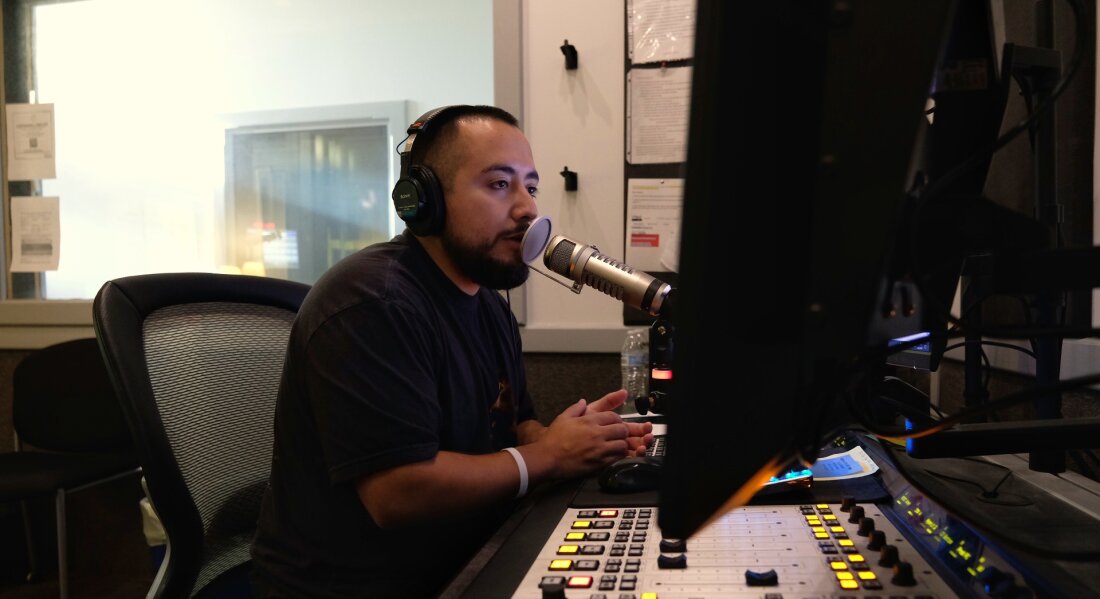Blue Ridge Public Radio anchor Jose Sandoval broadcasts to the Spanish-speaking communities in western North Carolina, providing recovery and relief information.
Gerard Albert III/BPR
hide caption
toggle caption
Gerard Albert III/BPR
ASHEVILLE—Nearly six weeks after Hurricane Helene slammed into western North Carolina, people in and around Asheville are still piecing together their lives.
News anchor Jose Sandoval’s daily Spanish-language broadcasts have been an essential lifeline for the small but growing Latino community in western North Carolina, providing information about public services and dispelling misinformation.
The broadcasts can be heard on Blue Ridge Public Radio, the Asheville-based public radio station for the far western part of the state.
Originally from Elgin, Ill, Sandoval joined Blue Ridge Public Radio about a year ago.
He said he was drawn by the “southern hospitality” when he moved to Asheville.
“I showed up during the Fall time. It is one of the most beautiful times in western North Carolina to see the leaves changing. The climate was amazing.” Sandoval said.
During a casual stroll downtown, he realized Asheville differed from the other cities he lived in.
” I didn’t see that many people that looked like me. There weren’t too many other Latinos and Hispanics walking around downtown,” he said.

Radio host Jose Sandoval speaks Spanish to the Latino community in Asheville and surrounding areas. Blue Ridge Public Radio also airs the county’s Spanish-translated Helene recovery briefings as a service to the community.
Gerard Albert III/BPR
hide caption
toggle caption
Gerard Albert III/BPR
While the Latino population in the Asheville area is small but growing rapidly, Sandoval knew he had to do something about the hurricane victims – mainly those with language barriers – once he fully grasped the scale of destruction around the city and rural areas.
“How will they be able to get their news, their information? Where to get food, where to get water? If they need shelter, where do they go, and how do they hear that in their language?” Sandoval said.
The county’s bilingual communications specialist, Rocio Quintero, had previous experience reaching Latino communities via the Internet since COVID-19.
But Helene’s winds and floodwaters knocked out power, Wi-Fi, and cell service, so it was “difficult to know how to get information about recovery efforts when these communication mediums were not working,” she said.
“We needed to get this out on the radios so people can turn on their cars and listen to what’s happening.”
There is a Spanish music radio station in western North Carolina, but it has limited news resources.
So Quintero contacted Sandoval at Blue Ridge Public, which was being powered by a generator and on the air live.
“And [she] asked me, ‘Can you please air the Spanish interpretation of the briefings on your radio waves’?” he said.
“At that point, it was like, ok, we can’t wait anymore.”
Sandoval called his boss, and they agreed to proceed without hesitation.
While Blue Ridge Public Radio’s signal reaches most of western North Carolina, Sandoval did not initially know if anyone in the storm-affected areas even knew to tune in to the radio to hear these briefings.
“We had no idea. Ultimately, we were doing this on faith in hopes that they were listening to it,” he said.
Sandoval did not waver. With help from his station colleagues, he managed to deliver critical information and dispelled misinformation in Spanish daily.
Close friends and Latino organizations who heard him on the air appreciated the effort. It was the only way to ensure his Spanish-language broadcasts were making an impact.
Amidst the chaos early on, Sandoval included details about which disaster survivor or food assistance program forms to fill out or which ones offered Spanish translation services. He debunked statements like,
“No, the government is not here to take over Chimney Rock, or FEMA is here to help you,” Sandoval said.
“It was really important to get that fact-checked information out there,” he adds.
Nearing Helene’s two-month mark, the station continues to air hurricane relief briefings every afternoon while the region remains in disaster recovery mode.
Sandoval has also included the occasional on-air interview with Spanish-speaking officials in the Asheville area.
He says there is still a steady stream of public service announcements and updates suited for these communities.
As one of two native Spanish speakers at the station, Sandoval says he is trying to figure out how to keep the Spanish-language content afloat.
“Even if we’re exhausted, we’re tired,” Sandoval added, “we know we have to keep doing this for the community.”


